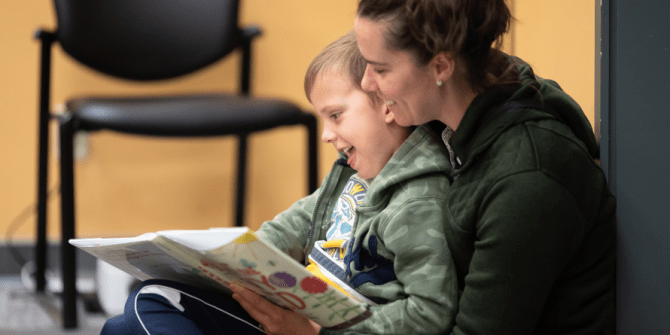Lori Blahey is a former Senior Marketing Consultant at EPL. Originally published in June 2020 and updated in March 2022.
Did you know reading can change your life? We’re not just saying that because we’re librarians—it's true! Research proves that children who are good readers are more likely to go further in school, have a higher income and be happier and healthier throughout life.
Unfortunately, learning to read is complex and it's not uncommon for children to struggle. As parents and caregivers, you are your child's first (and best) teacher. Supporting their reading journey is one way you can help them reach their full potential. Not sure where to start? Give these tips a try!

10 Ways to Help Children Become Good Readers
Tip 1: Borrow Books
Quite simply, access to more reading material means more reading. Chapter books, pictures books, comics, Easy Readers, audiobooks, eBooks, eAudiobooks—we have so many formats available across a range of topics and interests. There's something for everyone at the Library!
Tip 2: Let Your Kids Choose Their Own Reading Material

Finding pleasure in reading has a huge impact on the development of literacy skills, so encourage your child to read anything and everything that interests them. Don’t worry if your child seems stuck in a rut and only wants to read (and re-read) every Captain Underpants book ever written. The repetition also helps their learning (we promise).
Tip 3: Don’t Discount (or Judge) Non-traditional Formats
Comic books, audiobooks, movies and video games can hook reluctant readers and often serve as gateways to reading print material. Embrace these options if they interest your child.
Tip 4: Enjoy Reading as a Family
Read out loud to each other, choose books together or have an older sibling read to a younger child. Never underestimate the impact of a bedtime story! Even with older children, that quiet reading time encourages snuggling, builds connections and allows for uninterrupted conversations with your children—all of which are important for developing literacy skills. While you may groan at reading the same book for the hundredth time, the routine and repetition are reassuring to your child and helps reinforce their learning over time. Not sure where to start? Host your own Family Book Club with a book of your choosing or join ours!
Tip 5: Model Reading Behaviour
Children who see others reading—and enjoying it—are much more likely to want to read themselves.[1] If you typically read on a screen, show your kids the text and explain what it is so that your child recognizes that you are reading.
Tip 6: Look for Opportunities to Sneak in a Bit of Reading
Reading doesn’t need to happen in long marathon sessions. Look for opportunities throughout the day to encourage reading, for you and your children—a few minutes here and there really add up! Have a doctor’s appointment or a grocery order pickup? Download some eBooks to your phone or tablet to make the wait a bit easier. Going for a car ride? Leave some books on the backseat or look for some interesting audiobooks to accompany you. Have a bored kid who likes to make things? Give them instructions for crafts or easy recipes they can make themselves.

Tip 7: Make Reading More Interactive
Reading is most effective when children understand what they’re reading. Talk about what you’re reading! Ask questions, look up new words together and try to relate the story to your child’s life.[2] Adult involvement is particularly beneficial to younger children developing early literacy skills.
Tip 8: Play with Language
Adults play with language all the time, whether it’s Scrabble, crossword puzzles or Wordle! Kids love to play too so sing songs with rhymes and alliteration (for example, Apples and Bananas or Old MacDonald had a Farm) and play games with words (for example, name an animal that begins with D).
Tip 9: Connect Print with Words
Track each word with your finger as you read to help the child associate the words they see on the page with the words you say. Encourage them to do the same when they’re reading.
Having children write down words also helps them practice making letter-sound connections. Ask them to help write a letter to a friend or family member or maybe write a shopping list! The words don’t need to be spelled correctly—invented spelling can help cement that letter-sound relationship.
Tip 10: Emphasize that Reading is Fun
Above all, it's important to show children that reading is a fun thing we get to do, not that we have to do. So, give your child a lot of praise. Re-read favourite books. Stop reading when it's no longer fun.
Like this blog post and want to share a copy?
Get More Tips with Kitchen Table Classroom
Want to learn more about how you can help your child succeed in school? EPL's Kitchen Table Classroom series is designed for parents to support their child's learning. We host sessions featuring expert guest speakers every two months across a number of topics, including reading!
Here are few videos you might like:
Helping Your Child Learn to Read for Kindergarten up to Grade 2
Helping Your Child Learn to Read for Grades 3-6
Motivating Your Infrequent Reader
- Scholastic Canada (2017). Kids & Family Reading Report, Canadian Edition. http://www.scholastic.ca/readingreport
- National Summer Learning Association (2014). How to Make Summer Reading Effective. https://www.summerlearning.org/knowledge-center/make-summer-reading-effective/


Add a comment to: 10 Tips To Help Your Kids Learn to Read